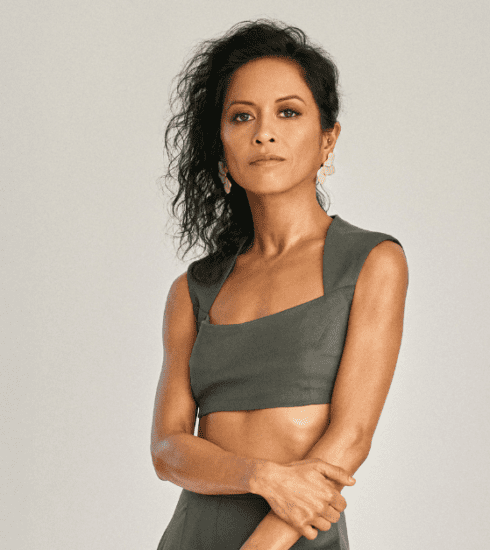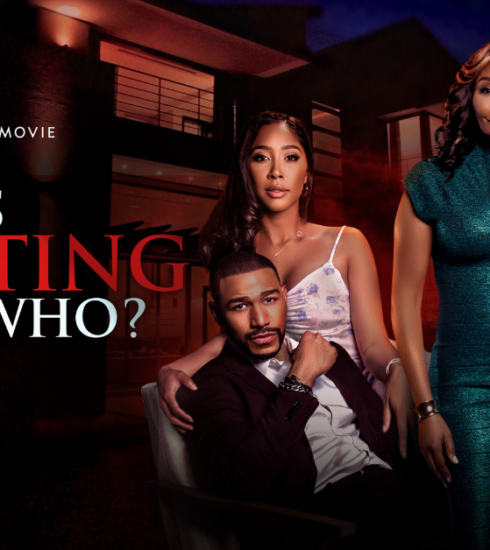Trina Nicole Is Dancing Like No One Is Watching
Trina Nicole is a dancer, model, digital creator, brand ambassador, and body confidence coach breaking barriers in the UK. With a curvy community that looks to her for inspiration and a social media following of 12.7K, she is amplifying marginalized voices worldwide. We sat down with Trina to discuss growing up black in the UK, her self-love journey, career, representation, and body positivity movement.
Who is Trina Nicole? Born and raised in East London, she is the seed of Caribbean parents from St. Lucia and Dominica. Nicole was surrounded by love, happiness, and culture. Music was the foundation of her proud household growing up, and dance was always a part of her heritage. A large part of her culture was attending Carnival. For the Caribbean, Carnival celebrates freedom, a declaration of survival, and honor to the ancestors. Nicole happily attended the Notting Hill Carnival with her family annually.
“To see people in the streets dancing, full of joy and having fun, I love that time of year,” said Nicole.
As an athletic youth, she indulged in sports of all forms. Football, dance, badminton, and swimming excited Nicole. However, with getting older came puberty and body changes that she was unprepared for. Furthermore, those curvaceous body enhancements provoked insecurities and unwanted attention that traumatized her. At only 13 years old, she was hypersexualized by men, making her extremely uncomfortable. So, she decided to drop out of every sport she was involved in to shield herself from the catcalls and judgment.
“I was developing much quicker than my friends, and I just wanted to shrink,” said Nicole. “I would ask my mom to buy me baggy clothes to hide my shape and curves so I wouldn’t get attention on the streets.”


It was tricky navigating the road to self-love as a young Caribbean-rooted black girl in London. The commercial Eurocentric beauty standard of blonde, straight hair, fair skin, and blue eyes was more accepted then. She did not see women who looked like her with wide hips, thick thighs, ample bosoms, and big butts. Representation of natural hair and full facial features was also lacking. So, who could she turn to for affirmation?
“Here in the UK, I didn’t see people that looked like me in the media, television, or magazines,” said Nicole.
Coming from predominantly white schools and workspaces where she was the only melanated face, Nicole engaged in code-switching. This meant that when she was around family and friends, her personality was larger than life, and when she was in those public spaces, she shrunk socially for acceptance. The struggle to find where she genuinely fit in was real. She battled with herself for many years about her body image and being comfortable in her black skin. When Nicole reached her early 20s, she realized she was tired of the mental and emotional turmoil. She was ready to embrace her body with all its curves and hair with all its kinks and take back her happiness.
“I spent so many years trying to change my appearance,” said Nicole. “That takes a lot of effort! Even mentally, it was so draining. So, I had to look within and realize that I am beautiful and that people who look like me are beautiful. It started with embracing my natural hair and then trickled down into other things.”
The pivot in her journey began in various significant stages. First, the compliments that she received from other women gave her solace. They admired her natural beauty and what they perceived as confidence. “If they can see something in me and they are celebrating me, why can’t I celebrate myself,” Nicole thought. From there, she started embracing her natural hair. Finding the beauty in her kinks and coils was so liberating! It was the catalyst for regaining her confidence, which sparked the motivation to use her voice on social media as a vessel for change. She utilized her content to challenge beauty standards while sharing her testimony, inspiring other women like her. Finally, she made her way back to her love, dance.


“I didn’t want to delay joy anymore,” said Nicole. “Life is short, and I just wanted to get back into the things that I loved doing, and dance was one of those things.”
Nicole eventually realized how instrumental dance was in helping her feel good about herself. “It was less about moves and more about my mental health, body connection, and overall well-being,” said Nicole. She sought studios around London where she could fulfill her passion, but it was not the warm welcome she had hoped for. The juxtaposition of her pursuit was that she loved how dance made her feel but hated how the studios made her feel. After being ostracized for her appearance, she created a space for women like her.
“I decided that I just wanted to be in a space where I can move my body freely, have fun, and experience that same joy that I always had at Notting Hill Carnival when I was a young girl,” said Nicole.
The Curve Catwalk, the UK’s first body-inclusive dance class, was born out of frustration. Nicole had experienced one too many stares and exclusions. Even worse, she was fed up with insensitive comments like, “You dance really good for a big girl.” So, she recruited some friends to join the classes that she taught. The first session was so successful that she was highly requested to make it a weekly meetup. What started as a small sanctuary for her became a haven many other ostracized women needed. Thanks to Nicole’s care and compassion, it is a judgment-free zone that has changed so many lives in more ways than one. Now, The Curve Catwalk community comprises over 8,000 plus-sized dancers and is the proud sponsor of Gempio Mas, one of the first size-inclusive carnival bands.
“I started realizing that as much as I started this space for myself, it was helping so many other people, so I needed to take it seriously,” said Nicole.


The word about Nicole’s body positivity movement was spreading like wildfire, and her name was starting to ring in the ears of professionals who could elevate her career. Soon, her content reached the phone screen of a Nike representative. After reaching out to her via social media with an offer, Nicole became the face of their “Own the Floor” campaign as a Nike Dance Ambassador. The doors were finally opening for the Caribbean-rooted black girl from East London, and the best part about it was that she could show up as her true self unapologetically.
“Being vocal and taking up space not only on the dance floor but online really benefited me,” said Nicole. “That contributed to me working with these brands because having someone like me who stands for body confidence and inclusivity be a part of their campaign was also beneficial to them.”
Since then, Nicole has been fortunate to be the face of brand campaigns with British Vogue, Gap, and Clarks Originals. She has graced commercial advertising for Simply Be, Virgin Atlantic, and Sainsbury Tu. Her digital content collaborations include Nike, Outernet Global, Savage X Fenty, and Sonos. Nicole has even made television appearances on BC Panorama, BBC Two, Channel 4, and Channel 5 to share her inspiring story. On top of that, she has been featured in press releases for Harper’s Bazaar, Glorious Sport, Bustle, and Stylist.
She relishes in the fruits of her labor. The Great British Entrepreneur Awards honored her as “Young Entrepreneur of the Year” in 2021. Forbes selected her as “One to Watch,” and she was named one of British Vogue’s “Forces for Change”. If only young Nicole could foresee her now. When society refused to give her a seat at the table, she built her own.
“It is always great to be recognized for your hard work, but the work continues,” said Nicole. “I make it a point to celebrate those moments. It is a part of the journey, but then I keep moving.”


She is not done building her legacy. She is just getting started. Nicole aspires to break more barriers in the industry. The Curve Catwalk is coming up on its fifth anniversary, and her goal is to expand and take it regionally so that shapely women outside of her neighborhood can get the experience. She plans to train other instructors to replicate the recipe and continue the mission. Nicole also strongly desires to mentor young girls and boys using the platform. Her purpose is to equip them with the tools she didn’t have to manage puberty, body confidence, and self-esteem. She wants to be the role model she longed for at that age.
“If I can work with young girls and help them stay in sports and feel confident, that is something that I would really love to do,” said Nicole.
Nicole continues to motivate the masses with her voice, talent, and character. She is leading a dance revolution that makes her proud. Knowing she is an authentic representation of beauty and self-love that young black girls and women can see and believe is fulfilling. However, heavy is the head that wears the crown. Nicole admitted that trying to make so many people proud can sometimes be overwhelming. Yet, she keeps her community at the forefront of her mind and reminds herself that it’s her contribution to change so that the next generation can feel more comfortable being themselves and see themselves represented. Nicole still pays homage to her culture yearly at the Notting Hill Carnival, dancing jubilantly in the streets. Like her story, the affirming message she left for anyone battling body image issues and self-confidence was incredibly moving.
“Find your tribe,” said Nicole. “You don’t have to do it by yourself. So many people struggle with body image and other things, so having people around you encouraging and supporting you makes a world of difference.”
Trina Nicole is setting the REAL beauty standard for self-love!
Credits:
Photography by | Jemima Marriot
Styling by | Harriet Nicolson
Makeup by | Amalie Russell using Bobbi Brown
Hair by | Alex Price






